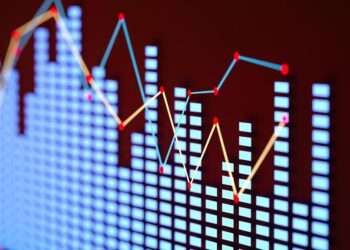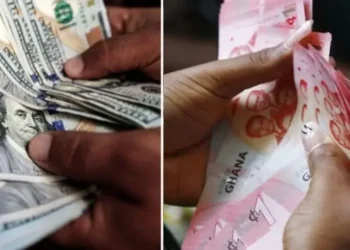In a rather surprised announcement by the Ghana Statistical Service (GSS), inflation started peaking up again after consecutive months of decline, and a Financial Analyst and Portfolio Manager at SIC Financial Services Limited, Mr. Isaac Kwasi Mensah, has predicted the local equities is likely to plummet as fears of out of controlled inflation returns to the market.
According to the analyst, in an interview with the Vaultz News, after days of rising performances coupled with mixed up trading sessions on the Ghana Stock Exchange (GSE), investors will lower their expectations since markets hate uncertainty.
“Inflation has started going up after months of sustained decline. As to whether the uptick in the inflation figures is temporary or not, markets generally hate uncertainty, and you can see that stocks started selling off since the announcement of the inflation data. Therefore, stocks are likely to plummet as a result of fears that inflation might be back on its previous dangerous path creeps investors and may likely spur out of control.”
Mr Kwasi Mensah
Mr Kwasi Mensah explained that the impact of rising inflation on a stock portfolio depends on several factors, including the degree of inflation, the overall health of the economy, the target holding period for the investment, and the specific equity sector.

“Rising inflation is not a good news to any economy. It can be costly for all aspects of the economy. The stock market, consumers and businesses alike, and the broader economy are all affected by increasing inflation.
“Inflation can force central banks to raise interest rates. It can erode the purchasing power of consumers. It reduces corporate profit margins due to higher costs. It can also cause wild price swings in stock markets, as we have witnessed so far throughout the year.”
Mr Kwasi Mensah
Not All Levels of Inflation Is Bad
The analyst contends that inflation up to a certain level is generally considered good for Gross Domestic Product (GDP) growth, because it can boost consumer spending, investment returns, job growth and corporate earnings, among other things.
“So, if inflation is in check, and the economy is in healthy shape, corporate revenues and profits are also expected to grow, resulting in greater market demand for the shares of companies with increased profits. A healthy economy with modest inflation often sets the stage for higher stock prices.”
Mr Kwasi Mensah
However, Mr Kwasi Mensah noted that it is only when inflation reaches high levels like what the country is currently experiencing that the relationship becomes more complex.
“In Ghana Stock Exchange, the consumer goods sector stocks will be affected the most since not all stocks are negatively impacted by high inflation. In general, stocks of companies that have pricing power, as well as those with strong balance sheets and the ability to continue paying good dividends to investors, will thrive better during unexpected periods of high inflation versus their peers.”
Mr Kwasi Mensah
Mr Mensah averred that tackling inflation should be an integral part of government’s focus and any financial planning strategy. He intimated that while inflationary surges can dampen consumer spending power and corporate profitability, they can also create investment opportunities. “For stock market investors, the key is to have an active portfolio management strategy to pick and choose the right companies and industries that can best weather the impact of inflation,” he said.
Meanwhile, the market was slower last week since the announcement of the inflation figures by the Ghana Statistical Service than previous weeks. During last week, the GSE-Composite Index and the GSE-Financial Stocks Index climbed marginally. The GSE-Composite Index made an upward adjustment of 0.33%, while its counterpart the GSE-Financial Stocks Index advanced by 0.95%.
However, there was unusually high level of activity on the market last week, pointing to the fact that investors were busily taking profits or stopping losses. In all, a total of 1,272,253 shares were exchanged, reflecting an impressive 219.77% increase in trading volume compared to the previous week. Furthermore, the total value of shares traded skyrocketed by an astounding 470.85%, reaching a substantial GH¢4,230,312.69.
With investors still in decision mood, the performance of the local bourse is expected to decline in this new week taking into consideration the inflation news.
During last week mid-week, the Ghana Statistical Service came up with its inflation figures for May 2023. Ghana’s consumer inflation accelerated slightly to 42.2% year on year in May, up from 41.2% in April, the statistics service said on Wednesday.
Ghana is grappling with its worst economic crisis in a generation and is restructuring its debt. Inflation reached a more than two-decade high of 54.1% in December, but it declined for fourth consecutive months up to April.
READ ALSO: “Floating Coffins”: Meeting Death While Seeking A Future Of Hope























